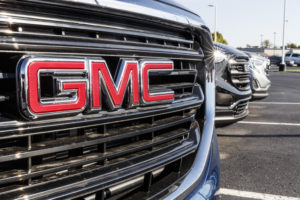
Updated: NHTSA directs GM to correct headlamp glare on 727,000 GMC Terrains
By onCollision Repair | Legal
The National Highway Traffic Safety Administration (NHTSA) has directed General Motors (GM) to recall approximately 727,000 model year 2010–17 GMC Terrain vehicles because their headlamps do not comply with a Federal Motor Vehicle Safety Standard (FVMSS).
Regulators on Friday turned down GM’s request that it declare the problem inconsequential, which would have relieved the automaker of the burden of contacting owners and providing a no-cost repair.
The problem has been corrected for service parts by adding graining to specific portions of the headlamp reflector, GM said. Those updated parts have been available since June 12, 2019.
Based on a consumer complaint, GMC investigated and reported to NHTSA that the low-beam headlamps on the Terrain “do not meet the photometry requirements of paragraph S10.15.6 and Table XIX of FMVSS No. 108,” NHTSA said.
“Specifically, a reflection from the headlamps’ housing is directed 80 degrees outboard and 45 degrees upward, as measured from each lamp’s optical axis, which illuminates two small areas high above the vehicle,” NHTSA said. “When tested by GM, this reflection from a single point on each lamp measured approximately 450-470 candela (cd),” more than three times brighter than the designated maximum.
While acknowledging the regulatory issue, GM asked to be exempted from the recall requirement, arguing that the noncompliance was “inconsequential as it relates to motor vehicle safety.”
According to a NHTSA summary, GM said the noncompliance caused by the reflection had no effect on the safety of oncoming or surrounding vehicles; that it had received only one complaint, and was unaware of any related crashes or injuries; and that the headlamps comply with global requirements.
NHTSA this week denied GM’s petition, finding that the automaker had not cleared the high bar set for determining that such a defect is not consequential.
“The burden of establishing the inconsequentiality of a failure to comply with a performance requirement in a standard—as opposed to a labeling requirement— is more substantial and difficult to meet,” NHTSA said. “Accordingly, the Agency has not found many such noncompliances inconsequential.”
The pending recall will be reviewed by the Certified Auto Parts Association, which certifies aftermarket parts made to replicate the original GM lamps, Stacy Bartnik, Industry Relations Manager, Transportation Technologies, for Intertek told Repairer Driven News. Intertek operates CAPA’s certification system.
“NHTSA recalls are monitored; if a car company service part is recalled, CAPA reviews the nature of the recall to determine next steps,” Bartnik said. “If that is found to be the case, actions such as but not limited to a part decertification, notification to the manufacturer, and a Public Safety Notice may be issued with applicable NHTSA Campaign ID.”
CAPA routinely requires ongoing compliance with FMVSS 108, and requires manufacturers to submit a sample from each CAPA-certified lot to testing.
“If any are found to not meet the requirements of FMVSS 108, the manufacturer would be notified, the applicable lot(s) would be decertified, and CAPA would issue a Public Safety Notice via the CAPA website,” she said.
“The CAPA Lighting Standard requires that the CAPA part must be compliant to FMVSS 108. This standard must be met even if FMVSS 108 noncompliance is found in the car company service counterpart,” Bartnik said.
She said that when an OEM modifies the design of a service part, as GM has done with the Terrain’s headlamps, “certified part numbers must remain current with all material, physical, chemical and dimensional changes made to the corresponding CCS part,” regardless of whether or not there is a safety issue.
CAPA issued a Public Safety Notice on March 8 for certified aftermarket headlamp units for four Lexus models: the IS 200t, the IS 250, the IS 350 and the IS 400. On its website, CAPA warns that “Park and Daytime Running Lamp functions may become inoperable. If this occurs, vehicle visibility to surrounding drivers will be impaired.”
Intertek/CAPA spokesperson Jillian Rahal previously told RDN that “public safety notices” are not recalls, because the third-party certification organizations are not the manufacturer – they only certify parts. The onus for addressing the problem rests between the distributor and the repairer.
“Installers of the part may contact the distributor who sold the part for advisement. Distributors holding parts may contact [the manufacturer] directly,” CAPA advises.
(This story was updated on March 11, 2022.)
More information
NHTSA: “Denial of GM’s Petition for Decision of Inconsequential Noncompliance”
Click to access 2022-04540.pdf
CAPA decertification & public safety notices: How to find out the status of your A/M parts
How does an aftermarket part become decertified? CAPA provides details
Images
A GMC SUV at a dealership. (jetcityimage/iStock)
